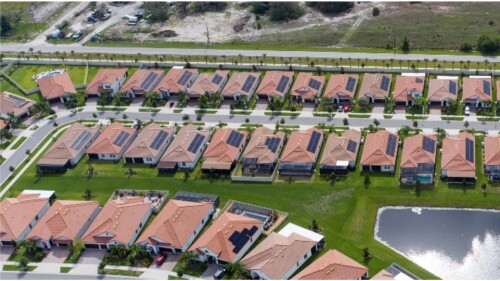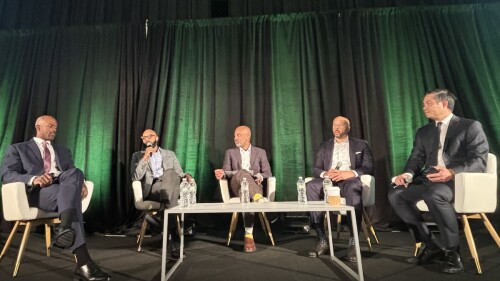The key challenge for providers of affordable housing in Asian cities is finding developable land and securing the capital to build housing on a massive scale, an international panel of housing experts said at the Habitat for Humanity Asia-Pacific Housing Forum in Hong Kong in September.
Panelists emphasized the need for collaboration between the public and private sectors and engaging local communities to address the problem of slum living in Asia.
An estimated 120,000 people flock to the cities in the Asia Pacific region every day, creating a demand for 20,000-plus new dwelling units per day. Many people arrive without the resources for adequate shelter and end up living in informal settlements, or slums. Habitat estimates that 500 million people in the region live in informal settlements.
“The infrastructure in our major cities cannot cope with current populations, never mind the predicted growth that continued urbanization will drive,” said Jonathan Reckford, chief executive officer of Habitat for Humanity International. “People who live in decent homes are better workers and make the city a thriving place.”
Reckford told participants that “the challenge is to make life more livable for people who are drawn to cities to find jobs and create that growth. Adequate housing and secure tenure are the basis for living. There are various ways to address long-term affordability of housing, but it has to start with the allocation of land.”
Habitat’s research paper, “From Slums to Sustainable Communities: the Transformative Power of Secure Tenure,” focuses on the importance of protections against being evicted from one’s home and the land it occupies. The report notes that “informal need not mean illegitimate,” and that residents of slums work in the informal and formal economies and thus make a significant contribution to cities’ growth. These communities need to be integrated into the urban planning system.
The question of housing is a major concern for Habitat for Humanity International, a U.S.-based nonprofit organization that has helped more than 5 million people build or improve their living conditions since its founding in 1976. Cities in particular face an enormous challenge as people continue to migrate from rural areas to cities in search of better opportunities.
The report describes security of tenure as a “continuum of land rights” ranging from perceived tenure to registered freehold, not simply related to the legal ownership of land. This secure tenure issue has been of particular relevance in recent years as entire slums have been cleared for new construction projects in some of Asia’s rapidly urbanizing cities such as Mumbai, India. The report’s authors argue that homeownership is not necessarily the solution to substandard housing or abused property rights.
Matthias Helble, research fellow at the Asian Development Bank Institute in Tokyo, said, “In Asia, there is a lot of focus on homeownership, but this is not always the solution. Singapore has been very successful in this regard, but the Singaporean approach does not work everywhere.”
Despite the importance of housing issues, they are not always at the top of the priority list, panelists said. John Fitzgerald, chief executive of ULI Asia Pacific, noted, “Housing is something that impacts everyone, yet is often left off the agenda; we need to work to highlight the problems of housing policies.”
Hong Kong—home of ULI’s Asia Pacific headquarters—does not have the informal settlements that are common in developing Asian nations, but it nonetheless struggles to provide adequate and affordable housing for its 8 million people. Wages have not kept up with skyrocketing housing prices there, so families have been forced to live in subdivided flats. Young couples are reluctant to move out on their own and have delayed starting families.
“ULI in Asia has a particular focus on workforce housing, looking at solutions for workers who cannot afford market rates in cities,” Fitzgerald said. “In Hong Kong, we are developing the first set of principles to contribute ideas for solving some of the affordability issues here.”
Rajesh Krishnan, founder and chief executive officer of Brick Eagle, an affordable housing lender and financial services firm in India, described some of the problems that Mumbai faces and outlined possible solutions.
“Half of the population of Mumbai lives in substandard accommodation,” Krishnan said, “yet the government owns a huge acreage of unused land, which could be rezoned for housing. If the government was prepared to contribute land at zero cost, we could develop housing for migrant workers for a cost to them of $2 per day.”
The problem, he said, is that large real estate developers tend not to get involved in affordable housing because the margins are not big enough. “Most affordable housing development is carried out by ‘mom and pop’ developers, and they need support to give them capital and talent. We can solve the affordable housing problem if more private sector players get involved.”
A problem around the region is getting stakeholders to work together, particularly with regard to community inclusion. The panel agreed that too often governments and the private sector combined to simply evict people from informal settlements in order to build improved housing, but without adequate consideration of the informal rights of slum dwellers.
“A lot of countries struggle to find the right blend of market and nonmarket solutions,” Helble said. Fitzgerald agreed: “A collaboration [among] the public sector, the private sector, and communities is essential. It’s in everybody’s interest.”
Mark Cooper is editor of AsiaProperty magazine.






